Since it was announced in May of 2023, Google’s new Search Generative Experience has brewed a lot of unease among SEOs.
To quell some of this uncertainty, we looked at thousands of SGE results and did our own analysis to uncover the probable impact of this revolutionary way of presenting search results.
In this blog, you'll learn five essential insights about Google's generative AI search experiment that you won't hear anywhere else.
Keep reading or catch our quick video below to prepare for this seismic shift in search.
Note: On May 14, Google introduced AI Overviews (AIO) in search following its testing phase in SGE. Discover everything about the impact of AI Overviews on SEO, how to monitor it, and more.
Table of Contents:
- 1. SGE Creates a Completely Different Competitive Ranking Landscape
- 2. Local Results: A Very Different Experience
- 3. Shopping Results Have One Major Change
- 4. Top of Funnel Research Queries At Risk
- 5. Intent Gone Wild!
- A Summary of What We Know So Far
Prefer video? Watch our quick 6-minute seoClarity short!
1. SGE Creates a Completely Different Competitive Ranking Landscape
If you think Google’s new Search Generative Experience considers the same ranking factors as traditional organic search, think again.
Here's a Google search result page for the query how to buy a bicycle:
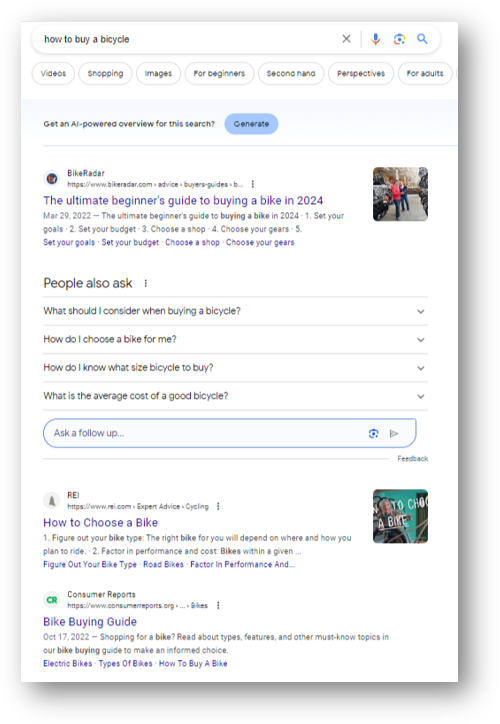
The results include a bicycle enthusiast publishing site, a retailer of bicycles, and a consumer advocacy magazine.
Now here's how that query looks in SGE:
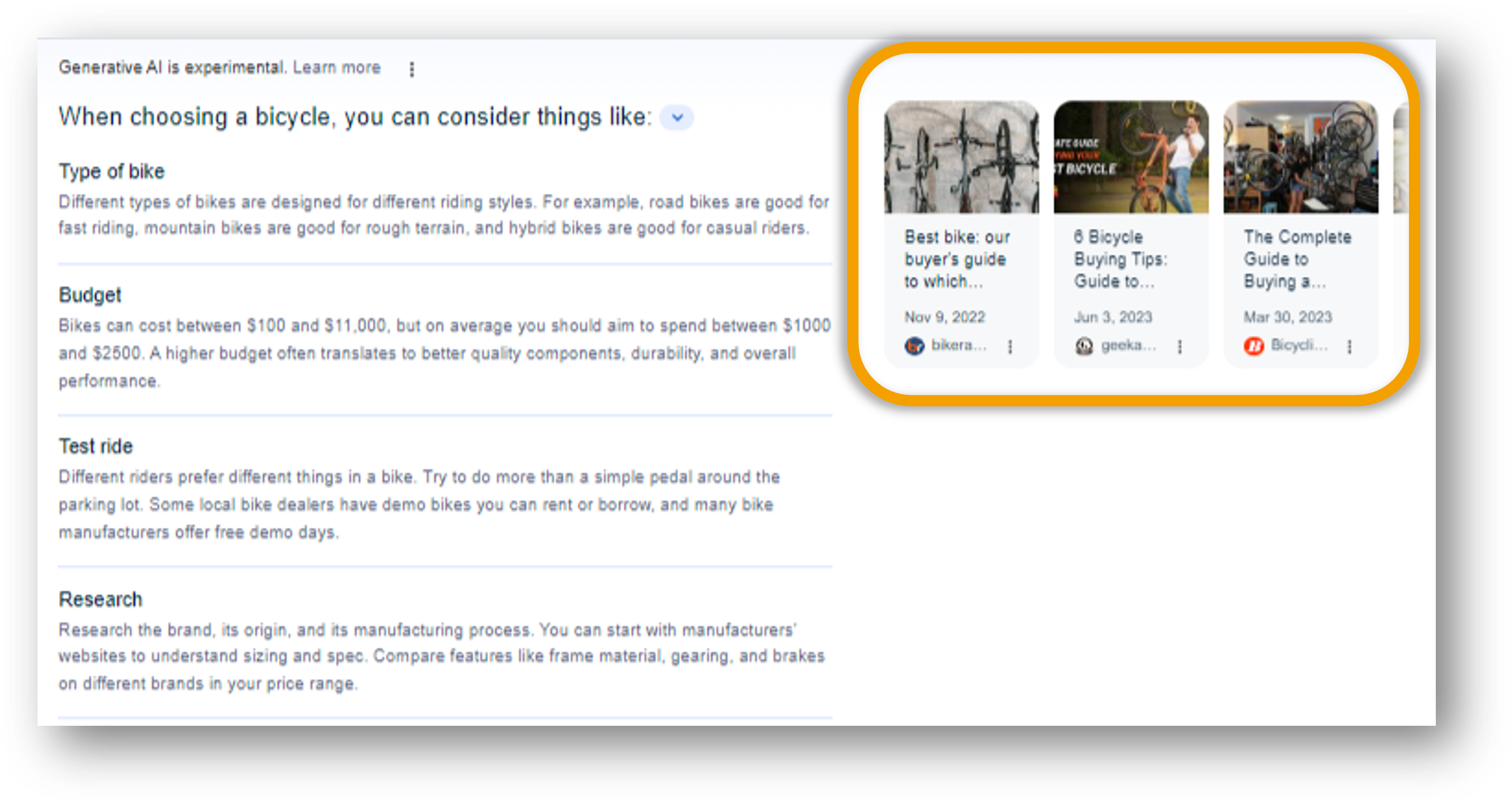
The pages shown in its carousel of recommended pages are not all the same as those on the first page of regular results. When there is overlap, the ranking order is not the same. Based on what we’ve seen so far, the factors used to determine what pages are shown as links in SGE are very different from those that decide what appears in the top organic search results.
Not surprisingly, for generative AI technology, it appears pages are chosen by SGE almost entirely on the relevancy of the content of the page. There does not seem to be any regard for traditional authority signals.
Because figuring out how to rank in SGE will be a whole new challenge, we consider this a high-impact change.
We're analyzing SGE's impact on various industries. If you're in the real estate field, check out these industry-specific insights!
2. Local Results: A Very Different Experience
If your business involves finding local outlets and resources, SGE currently provides a less satisfying experience than traditional local search results.
Here is my local result in traditional search for the query “plumbing repairs near me”:
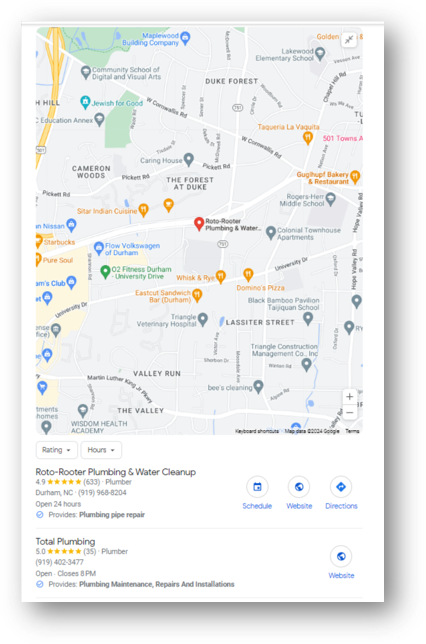
Google has centered the results around my neighborhood, actually giving me the plumbing services that are closest to me.
SGE, however, is dependent on recommendations from third-party sources that are lists for my city in general, not necessarily services that are actually near me.
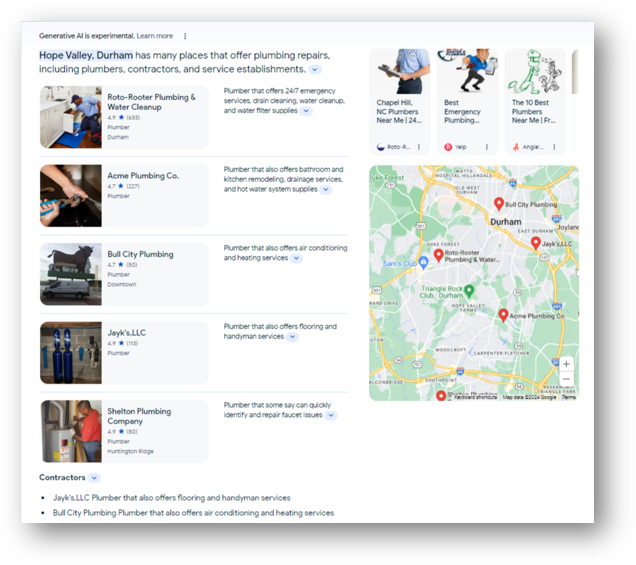
We think users will find the traditional results more useful, so we rate local results on SGE as low impact.
3. Shopping Results Have One Major Change
Shopping results won't change all that much, except for one very important detail.
At first glance, SGE's presentation of products for transactional intent queries looks quite different from organic results.
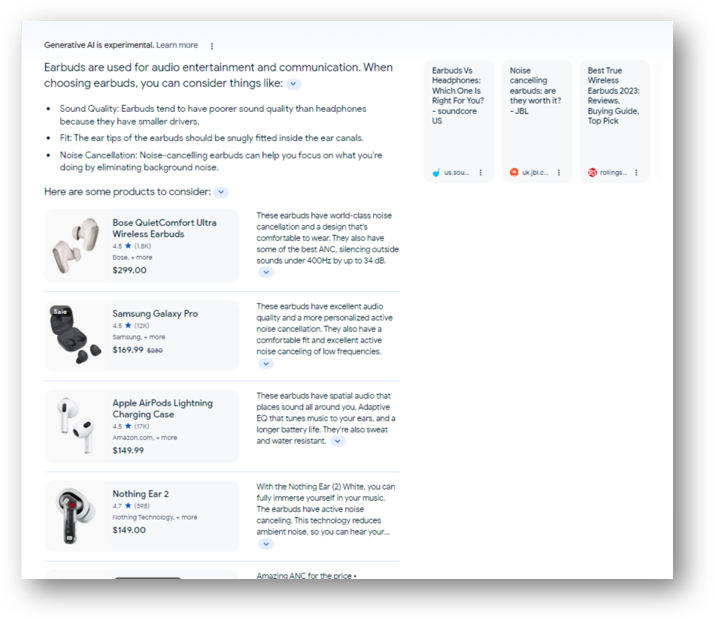
But clicking any of the recommended products brings up a filtered shopping experience. This expereince is very similar to the experience we now see for products and traditional results with filters, prices, reviews, multiple images and more.
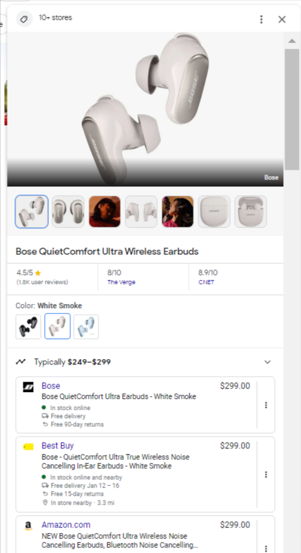
While the SGE version provides only product results, the web version has a lot more options.
If your site is ranking high as a web result in regular search for this query, you're left out in SGE. For that reason, we judge SGE will have a high impact on traffic for online sellers.
4. Top of Funnel Research Queries At Risk
SGE will have the biggest impact with its ability to summarize upper funnel research queries.
Users may come to prefer SGE's ability to concisely summarize the main points from several different web pages, answering their questions with little need to click through to those pages.
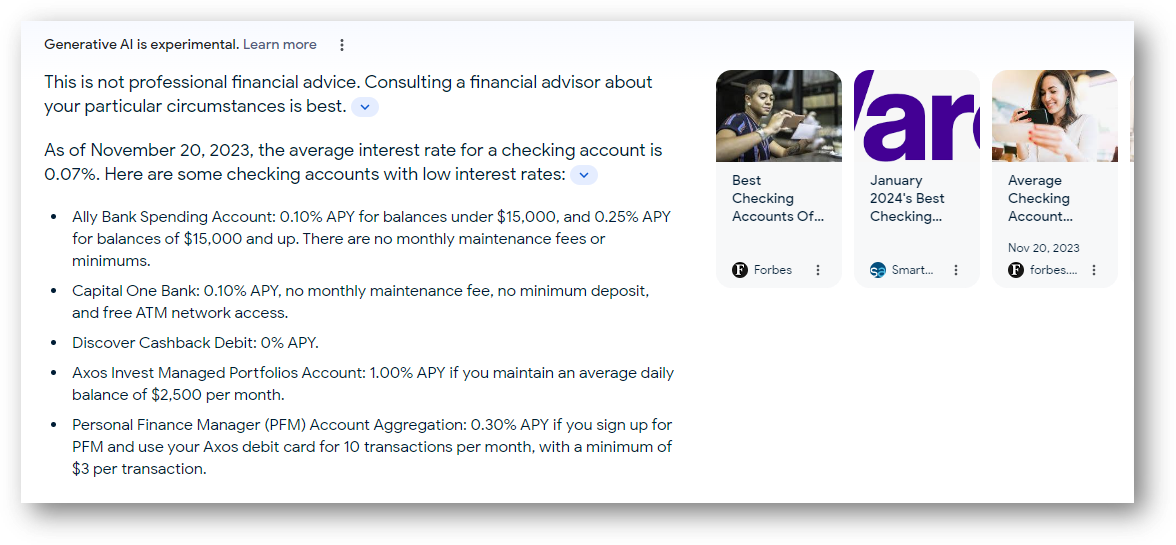
But perhaps of even greater concern is whether your brand or product show up in the result, and that seems to depend on whether you are mentioned in the sources used by the AI. Quite often those sources are third-party roundup sites, with lists of “the best of ____” or “top ten ___.”
For these reasons, we rate these SGE summaries as potential high impact for brands that don't show up on the sources the AI chooses.
5. Intent Gone Wild!
SGE often reads the intent of a query differently from traditional search.
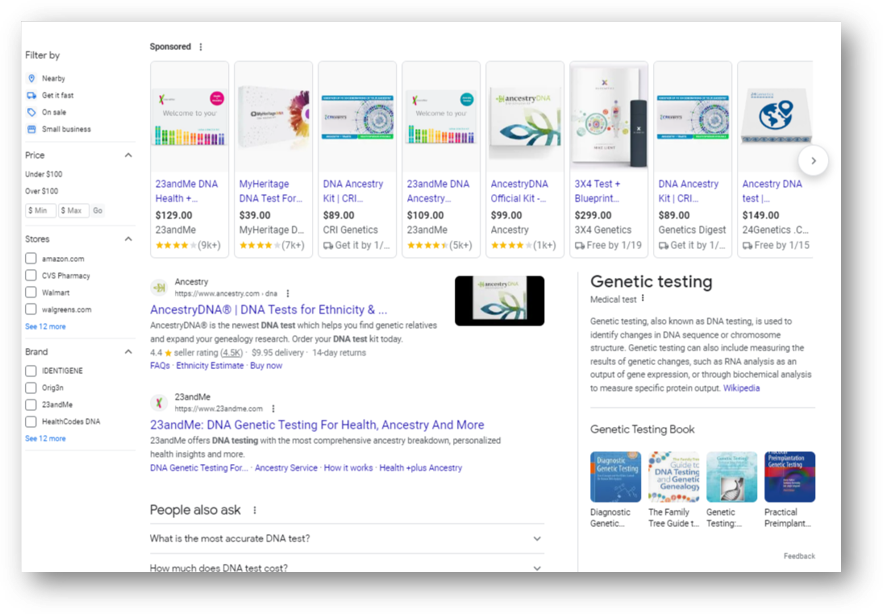
For example, for the query “testing DNA,” regular Google gives me a side panel of information about the term itself. But otherwise, almost all the organic results are about services offering DNA testing.
This is because Google observes the click behavior of searchers over time and therefore knows that most people searching this term are looking for a service, not a definition.
But, as you can see below, SGE treats this query as purely informational. It is merely doing what generative AI does – guessing what the user wants to see based on statistical probabilities in its training sources.
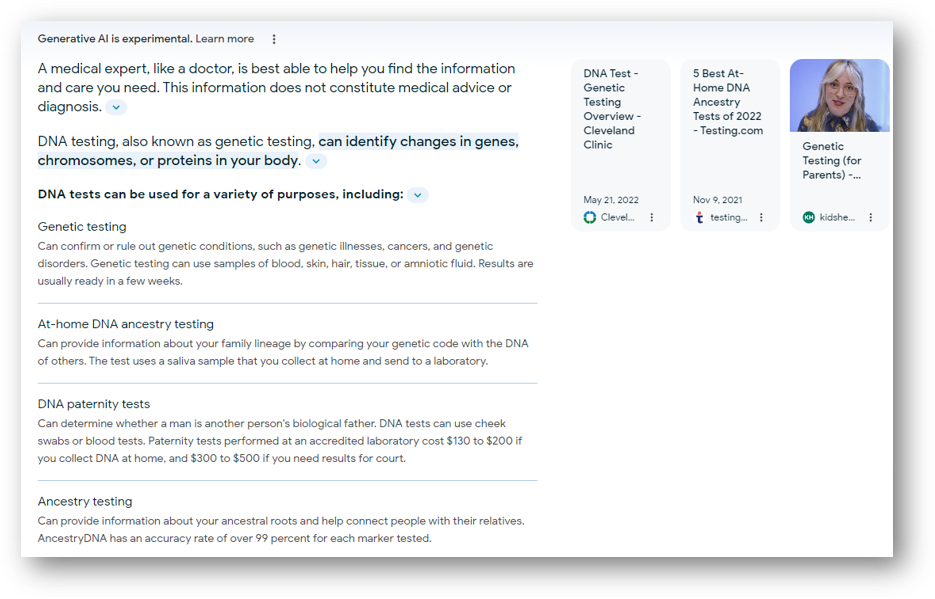
So far, Google has kept it separate from the type of data and factors organic search makes use of.
It will be interesting to see if there is any attempt in the future to blend them more. So our judgment here is low impact whenever SGE fails to match well-established user intent for a query.
Want to know what enterprise SEOs really think about generative AI? Dive into their collective thoughts, experiences, and concerns in our GenAI in SEO survey report.
A Summary of What We Know So Far
Let's sum up what we've covered here.
- Rankings totally different [high impact] - SGE's method of selecting and ranking pages it shows is completely different from traditional ranking factors. This could have high impact on sites currently ranking high for keywords.
- Local results sub par [low impact] - SGE's presentation of local results is clearly not as good as the traditional results, so if it remains as it currently is, users will probably prefer not using it.
- Shopping results limit traffic opportunities [high impact] - Shopping results could have a high impact if you are not showing up in Google's product results. No web results are shown, so some brand sites will lose traffic.
- Top of funnel research useful (but you may be left out!) [high impact] - Informational searches could have a high impact if your brand isn't included. The key to getting included seems to be getting mentioned in third party lists that SGE depends on heavily.
- Intent sometimes “off” [low impact] - SGE is very bad at understanding the intent of queries. If users see this mismatch often, it may sour them to using SGE.
We hope this impact report helps give you some insights in planning for SGE. For a more comprehensive overview on how to prepare for this major change in search, check out our complete guide on navigating Google’s Search Generative Expereince.
We’re keeping a finger on the pulse of all things SGE so stay tuned for more updates on what's next for SGE as we uncover it!
Have any additional SGE-related questions or concerns? Send an email to support@seoclarity.net or reach out to your Client Success Manager.





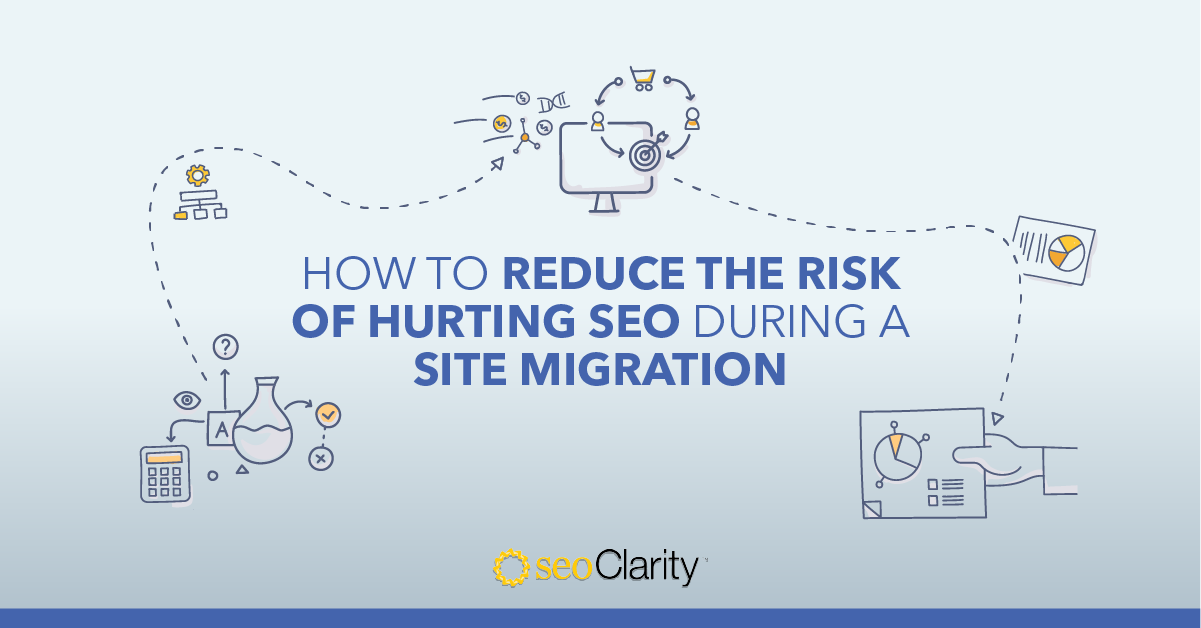

Comments
Currently, there are no comments. Be the first to post one!